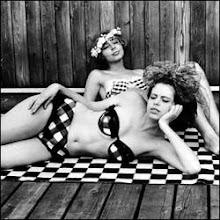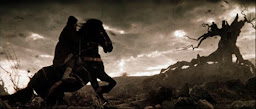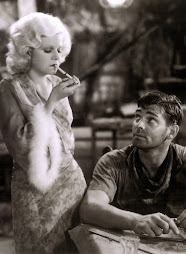This is how cheap I am. I'm so cheap that I go up to Ann Arbor on Monday nights and sneak into the screenings for a film class that my cousin is taking. She tells me the film for that week, I determine whether I want to see it or not, and if I do, the day arrives, I pop a bag of popcorn and grab a bottle of Diet Pepsi, and she and I go to her class's screening. So far, I've seen The Grand Illusion and Bonnie and Clyde, two films I had only seen previously on my TV screen. It's awesome. A big screen, an audience, free. And since I'm not actually taking the class, no homework or lectures. With this scheme, I've taken the act of living vicariously through others to its perfect apex. My cousin tells me all the fun stuff from her lectures with the boring parts left out; I get to criticize and nitpick her GSI's ability to run a discussion without actually having to deal with said GSI; and I go to the film screenings with her but don't have to write papers on them. It's like I'm in college again, only better.
Yesterday was a day I'd been anticipating for a long time. Yesterday was The Shining Day. Probably in my top six favorite horror movies. Effin' creepy. Blood coming out of elevators, rotting old lady flesh, "All work and no play makes Jack a dull boy," attempted ax murder, the 1920s. That's some creepy shit. It was weird watching it with an audience too. They laughed in spots, which was jarring, but the laughs made sense, seeing as Jack Torrance goes so crazy at some points you're not sure whether to laugh at him or cower in fear. I loved the atmosphere as we watched: This is one messed up movie, and we could all feel it, and we fed on each other's fear and revulsion. I loved how people around me were covering their eyes and creeping down in their seats (just like me!) when Jack first walks slowly through room 237. It's why we go to the theater, to share experiences like this.
I recently got into an argument with a friend who hates going to the movie theater. He claims there's no reason to, since the theater is expensive, the seats are uncomfortable, the people in the audience are annoying and eat their popcorn too loudly, and you can't pause the movie if you have to go to the bathroom. My arguments, that the big frakking screen is unbeatable and that you go for the atmosphere, and yes, that includes the munches of the audience, because there's nothing so awesome as sharing that collective emotional experience, whether it be surprise or dread or laughter or sadness or excitement or joy -- you can feel it when you and the audience are both experiencing the same emotions and it's thrilling. Like the shared gasp when Frodo gets stabbed by Shelob. I knew he wouldn't die, having read the book, but I couldn't help being caught up in the very palpable feeling in the air that the shit has just gone down and we, the audience, all just got mindfucked. That's why you go to the theater: Big frakking screen and shared collective experience.
So, that's why I've been going to the "theater" in Angell Hall, even though these are all movies I've seen before. It's a unique experience getting to see a movie on a big screen, with an audience; a movie that you've only seen previously on your couch, alone, at home.
Immediately after viewing it, I became obsessed with the central question (in my mind anyway) of the film: Why the 1920s? Why did Kubrick choose to have Jack's soul be trapped in a picture from July 4, 1921? Why all the 1920s ghosts and the 1920s party in the Gold Room?
I have a confession (which I also touched on, in a way, in this former post): The 1920s kinda freak me out. As do silent films and black and white films from the 30s (especially the early 30s). I explained in the post linked above that I think it has to do with the oldness of the images and the black and white that kinda makes everything look ghostly. But after watching The Shining again for the first time in many, many months, the old question has arisen again. Why do I find the 1920s so creepy? It's a sort of chicken/egg question: Was I always creeped-out by the 1920s (are they just inherently creepy?), or did The Shining create the creepiness? I'm pretty sure I first saw The Shining when I was in middle school (I'm thinking it was about age 13), and the ghosts/visions in that film are all from the 20s, so it could have been early enough in my life that the movie was able to shock my psyche and screw up the 20s for me. Just like those gloriously weird ghosts in the film, this question has haunted me.
After the movie last night, I went back to my cousin's dorm room and proceed to google various combinations of "1920s the shining/the shining 1920s why/the shining 1920s explanation/reason 1920s party the shining" to get some answers. I was obsessed with knowing why Kubrick would show visions of a party at the Overlook from the 20s and have Jack eventually be seen in a photo from a party in 1921. Did Kubrick think the 20s were as creepy as I do? Did he hit on some unconscious understanding we all subconsciously share that the 1920s were one effed-up decade and therefore perfect subject fodder for a horror film? Or was there no explanation at all; was it just one of the many random things Kubrick threw into the film to keep the audience disoriented and off-balance? Probably needless to say, my google search didn't provide me with a succinct, clarifying, all-questions-answered answer. I read a lot of really awesome theories and analyses, though, all about mythology and fairy tales and psychology and Colorado and the Red Room and White America's injustice against the oppressed Peoples of Color. It made for some fun, strange reading. So that was good.
In the end, though, I was able to find out that Stephen King actually wrote quite a bit about the history of the hotel in his original novel, so it wasn't like only the 1920s were particularly evil -- there was evil stuff happening throughout the decades in the Overlook. And through process of elimination, my cousin, her roommate, and I decided that if you're going to have spirits from the past haunt your movie and you've got between the years 1907 and 1980 to choose from, there's really no other decade you can choose that's going to be scary as hell and appropriate for a big ball room party scene except the 1920s.
Think about it. The 70s were too recent for the present-day events of the film (sure, the 70s are scary, but how scary could they be for people in 1980 -- it's practically still the 70s!). The 60s had scary hippies, but they wouldn't work for a high class hotel like the Overlook. The 50s might scare ignorant left-wing hipsters, but no, Donna Reed and men in suits and skinny black ties are just not scary. The 40s had guys in cute sailor outfits and riveting Rosies, no scares there. The 30s can definitely be scary (dig these ghosts!) (Pre-Code talkies -- ahhhh!!! The grainy film, the black and white, men wearing stage lipstick and eye liner, the high falsetto-voiced male singers, the Busby Berkley numbers. Scary. Though I have to admit, in a good way.) But the 30s also had the Depression, and who can afford to stay at some high class joint when half the country ain't got no job!
The 1920s -- they've got all the creepy factor of the early 30s, plus the feathered, beaded, fringed Flappers, gin-soaked parties of lavish wealth and privilege, crazy hedonistic sex orgies (possibly), and a general wantonness that would fit with a ritzy hotel that makes people go psycho killer. You can possibly imagine a bunch of drunk, high class 1920s blue bloods resorting to cannibalism if they got bored enough at a soirée. The 1910s were too occupied with The Great War. Sure the Titanic can certainly conjure up some good ghost images, but there's just not enough hedonism in the 10s to be truly as depraved as the 20s. And then we're getting into the years when the hotel was built and those won't really do.
So, in the end, it has to be the 1920s. Kubrick knew what he was doing. Only the 1920s would do for a horror story about a richie rich hotel. The 1920s, inherently creepy and messed up, or only made so because of Stanley Kubrick's film? I think the answer is, a little bit of both.
This sticker is dangerous and inconvenient but I do love Fig Newtons
Tuesday, March 18, 2008
My big Shining day, Part II
Subscribe to:
Post Comments (Atom)












_01.jpg)







4 comments:
I saw The Shining two months ago with a full house in a big theater, and it was more fun than a weekend with Batman.
Believe it or not, I was also haunted by the niggling question: why the '20s? (A follow-up question: why the Diane Arbus twins?
I think you answered your own question in the second-to-last paragraph. The '20s were a prosperous time, which inevitably gives way to hedonism, wild sex orgies, strange crimes etc. Just read Hollywood Babylon if you don't believe me. Oh, and exactly what was that dude in the animal suit doing to that tuxedoed man in the bedroom? Yeah.
For some reason or other, a lot of really good ghost stories came out of that period, even some not-quite-ghost-stories like The Great Gatsby, which has its fair share of haunting imagery. I mean, look at that cover for gosh sakes. (Tangent: Jack Clayton, the director of The Innocents, did an adaptation of Gatsby, which begins with a series of shots of an empty house, accompanied by the distant sound of an old Victrola. Creeeeeeeeepy.)
Also, old photographs, images caught in limbo, are simply ghost-like to begin with. No wonder Kubrick chose to end the movie on that shot!
Fantabulous post, Derelict. Keep 'em coming.
Dude! That picture of the twins?!? Are you trying to keep me locked in my room in terror!?! ;)
I can't believe you mentioned 'Gatsby' because I almost included it in my post but then I was like, "Naw, I can't include my thoughts on 'Gatsby' in all this, people already must think I'm totally crazy, I can't confirm it by writing about the ghostly 'Gatsby' and how the eyes of Dr. T.J. Ecklwhatshisnameberg freak me out." And the Jack Clayton '74 version! I had totally forgotten about that! The Victrola!
Just the word itself is creepy: Victrola. It sounds like the name of some long-dead female spirit in a bad Poe rip-off. Put some echo-y '20s tune on it and it's instant horror. I'm glad I'm not the only one who thinks: "1920s? Scary."
As I was researching this whole thing on the Internet, I ran across several summaries of King's book (which I have not read) and I remember thinking to myself: "Well, for whatever reason Kubrick chose to include the 1920s history of the hotel, I'm glad he did." In King's book, all the ghosts and horrors of the hotel are just too typically ghost-story/poltergeist stuff for me, and the many decades of the hotel's history almost seem like a distraction from the awesome creepiness of the 1920s history.
I'm sure the book is scary or whatever, but Kubrick's version just seems to be more in line with my own horror sensibilities. The 1920s (did I mention they scare me? ;)), the fairy tale motifs, the mythological stuff, the archetypal/primeval-ness of it all, just fits so well with what gets under my skin, much more so than King's hedge monsters and mafia gangsters. Maybe it's the Italian in me, but murderous mafiosi don't scare me nearly as much as pasty Anglos doing illicit things with Furries. (Though, to be fair, the man in the dog/bear suit is in King's novel as well. But Kubrick made the right choice to include it in the movie, as opposed to some of the other stuff from the novel that he left out.)
Thanks for the great comments!
Now that you've provoked me, allow me to mention two more films in the genre which shall henceforth be known as "flapper horror." Both were made by Lion's Gate and released within a year of each other, and both co-star Cary Elwes and Eddie Izzard. (Did they have a studio contract or something?)
The first is Shadow of the Vampire, which equates silent filmmaking with vampirism. The second (and this isn't really a horror film at all, unless you consider the horrible things people do to each other in this movie) is The Cat's Meow, which solves the riddle of what went down on William Randolph Hearst's yacht the weekend Thomas Ince was killed. There are a couple of really good scene that involve the entire cast dancing the Charleston, a dance long overdue for a comeback.
"Flapper horror" -- I love it!
You know, I caught the end of Shadow of the Vampire on TV a long time ago but I've never seen the whole thing. Now I'll definitely have to check it out.
Never heard of The Cat's Meow, but you had me at William Randolph Hearst. ;)
Thanks for the recommendations!
Post a Comment